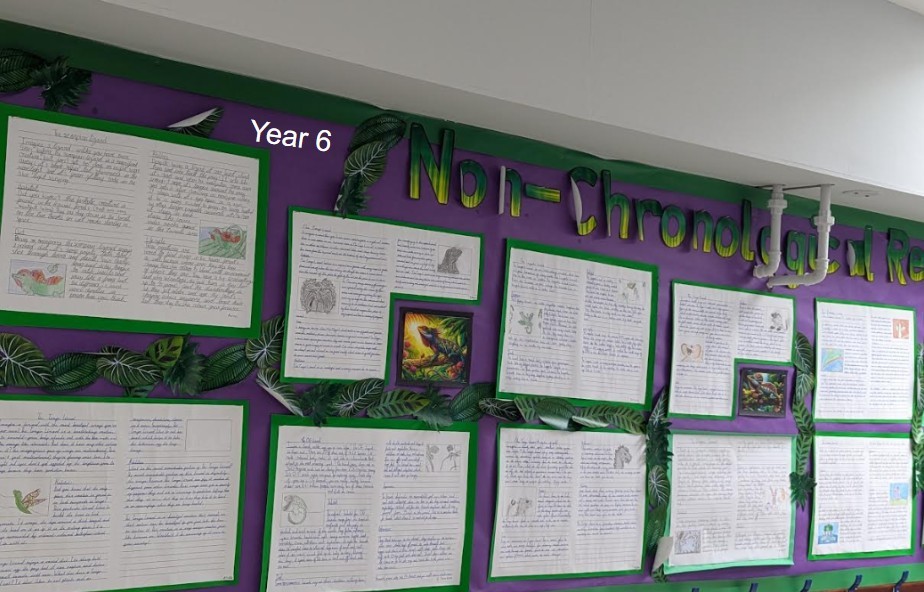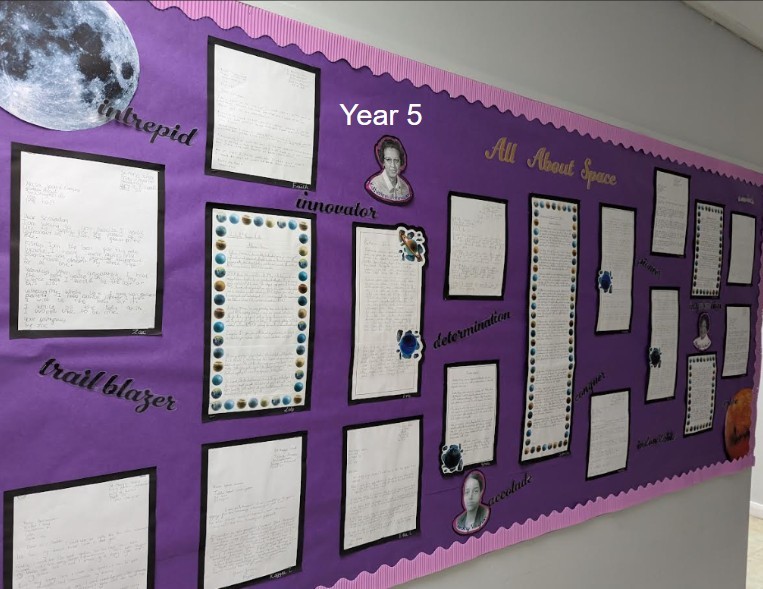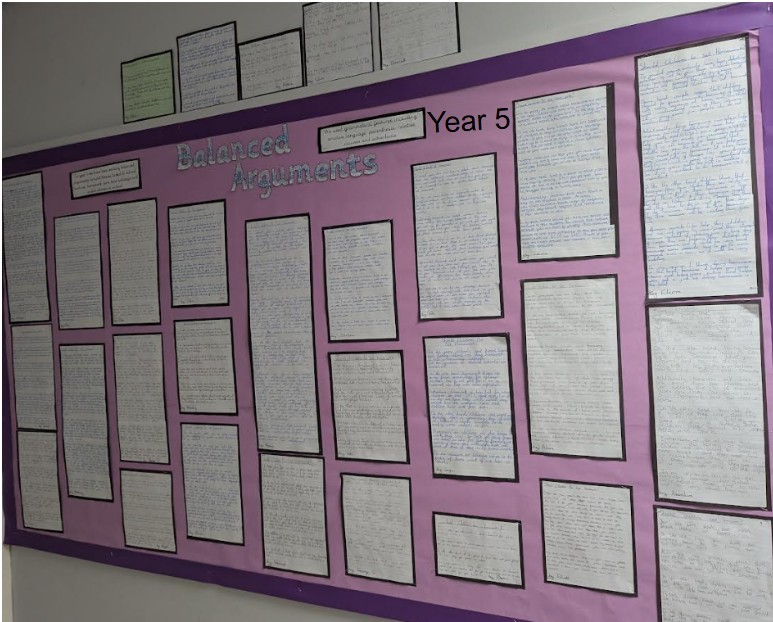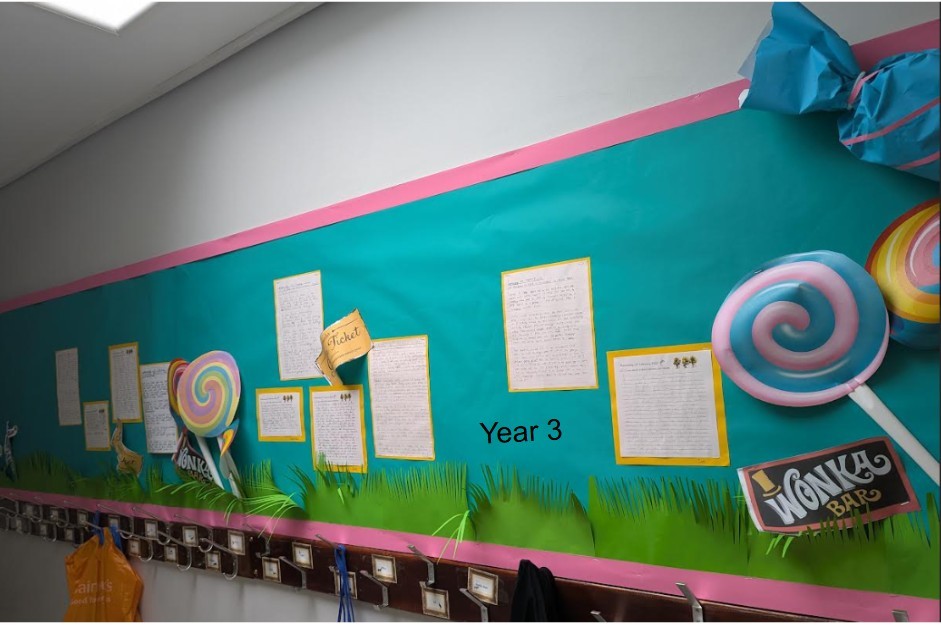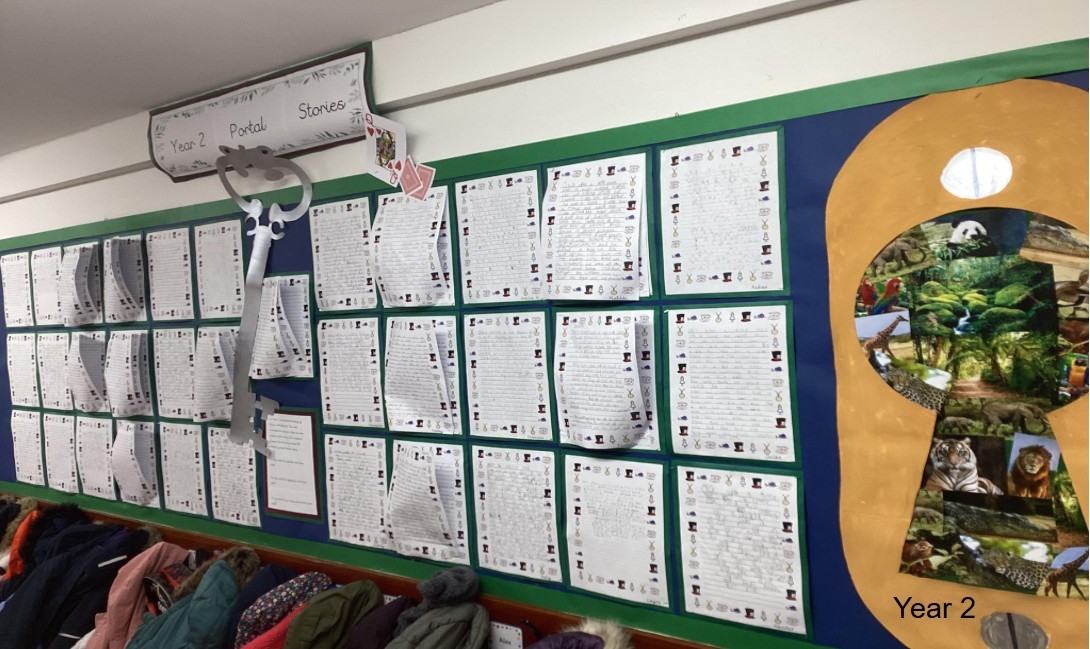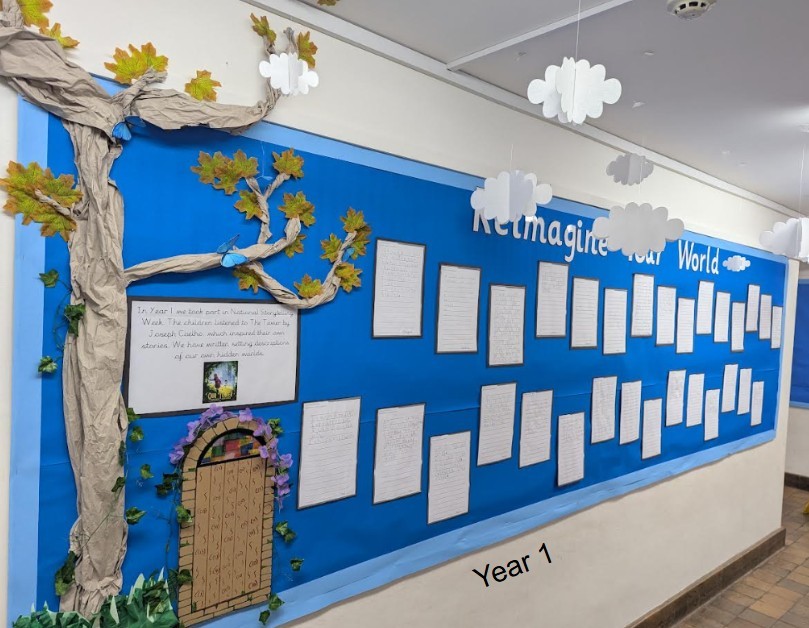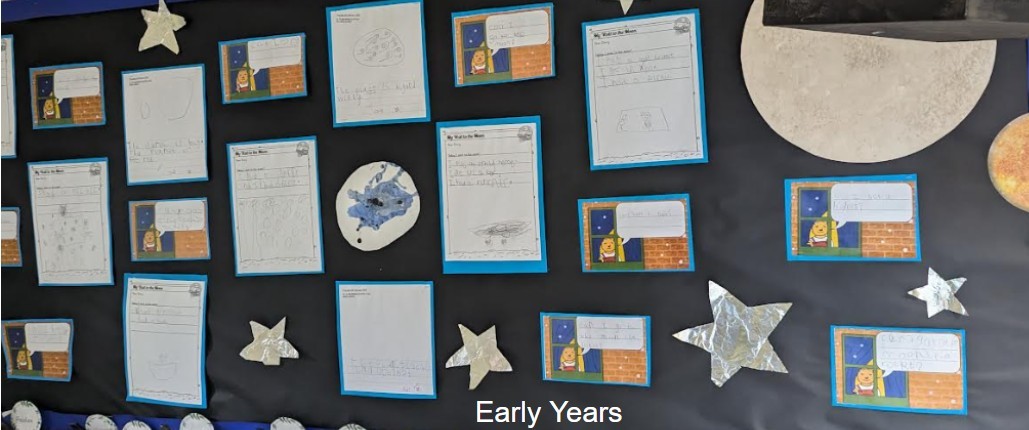Intention
Our primary intentions for the teaching and learning of writing are to:
-
Develop Competence: Ensure all pupils develop the stamina and skills to write at an age-appropriate standard, demonstrating proficiency in spelling, punctuation, grammar, and handwriting.
-
Foster Creativity and Expression: Encourage pupils to use writing as a means of expressing their thoughts, ideas, feelings and imagination across a wide range of genres and contexts.
-
Promote Purposeful Writing: Enable pupils to understand that writing has a purpose and to adapt their style and content accordingly for different audiences (e.g., to entertain, inform, persuade, discuss).
-
Cultivate a Love of Language: Inspire an appreciation for rich vocabulary and varied sentence structures, encouraging pupils to become adventurous and ambitious in their word choices.
-
Ensure Inclusivity: Provide a writing curriculum that is accessible and challenging for all learners, including those with Special Educational Needs and Disabilities (SEND) and those who are learning English as an Additional Language (EAL), ensuring every child can experience success.
-
Develop Critical Thinkers: Equip pupils with the ability to plan, draft, revise, edit, and evaluate their own writing and the writing of others.
-
Integrate Writing Across the Curriculum: Provide meaningful opportunities for pupils to apply their writing skills in all subject areas.
-
Prepare for Future Success: Equip pupils with the essential writing skills necessary for their transition to secondary school and for their future lives as effective communicators.
Implementation
To achieve our intentions, we will implement the following strategies and approaches:
Curriculum and Planning:
-
A clearly mapped, progressive writing curriculum based on the National Curriculum for England, ensuring coverage of all statutory requirements for each year group.
-
Long-term and medium-term plans that sequence learning logically, building on prior knowledge and skills.
-
Short-term planning that is responsive to pupils' needs, incorporating engaging stimuli, high-quality texts (including fiction, non-fiction, and poetry), and real-world contexts for writing.
-
Opportunities for pupils to write for a variety of purposes and audiences, experiencing a range of genres such as narratives, reports, explanations, recounts, persuasive texts, and poetry.
-
Explicit teaching of the writing process: planning, drafting, sharing, evaluating, revising, editing, and publishing.
Teaching and Learning Strategies:
-
Modelled Writing: Teachers will explicitly model writing techniques, demonstrating how to structure texts, use grammar and punctuation effectively, apply spelling rules and check unknown words, and make appropriate vocabulary choices.
-
Guided Writing: Whole class, small group or individual instruction targeting specific writing skills based on assessment of pupil needs.
-
Independent Writing: Regular opportunities for pupils to apply their learning independently, with appropriate support and challenge.
-
Talk for Writing: Utilising oral rehearsal, storytelling, and discussion to develop ideas and language structures before writing.
-
Vocabulary Development: Explicit teaching of ambitious and subject-specific vocabulary, with strategies for pupils to learn and apply new words.
-
Grammar and Punctuation: Explicit and contextualised teaching of grammar and punctuation, linked to model texts and writing outcomes.
-
Spelling: Systematic, research - informed teaching of spelling through a morphology - first approach in KS2 which builds upon the Sounds Write phonics approach of EYFS and KS1. This taught while practicing the key suffixing rules needed for spelling as well as the NC Statutory words.
-
Handwriting:Consistent and progressive teaching of handwriting (or keyboarding skills where appropriate) to ensure legibility and fluency, following the school's agreed handwriting scheme.
-
Feedback and Marking: Providing constructive, timely, and specific feedback (both written and verbal) that helps pupils understand their next steps for improvement, in line with the school's Marking and Feedback Policy. This will include opportunities for peer and self-assessment.
-
Use of Technology: Integrating appropriate technology to support writing, such as word processing, presentation software, and online research tools.
-
Target Setting: Personalised target setting based on individual gaps or next steps identified during formative and summative assessment.
Resources and Environment:
-
A rich learning environment that celebrates writing, with displays of pupils' work, working walls, and access to a wide range of writing tools and resources.
-
Access to high-quality model texts and a well-stocked school library.
-
Use of age-appropriate dictionaries, thesauruses, and other reference materials.
Inclusion:
-
Differentiated instruction and targeted support to meet the needs of all learners, including scaffolding for pupils who require additional support and extension challenges for more able writers.
-
Use of individualised strategies and resources for pupils with SEND, as outlined in their support plans.
-
Support for EAL learners to develop their English language proficiency alongside their writing skills.
Professional Development:
-
Ongoing training and professional development for staff to ensure they have the skills and knowledge to teach writing effectively.
-
Opportunities for teachers to share good practice and collaborate on planning and assessment.
Parental Engagement:
-
Communicating with parents about the writing curriculum, assessment and target setting, and their child's progress.
-
Providing guidance and resources for parents to support their child's writing development at home.
-
Celebrating pupils' writing achievements with the wider school community.
-
Weekly SPAG homework
Impact
The impact of our writing policy will be measured through a variety of methods, focusing on pupil progress, attainment, and attitudes towards writing.
Assessment and Monitoring:
-
Formative Assessment: Ongoing assessment for learning embedded in lessons, including observation, questioning, discussion, and analysis of pupils' written work to inform planning and identify next steps.
-
Summative Assessment:Regular summative assessments of writing against year-group expectations and key objectives using independent writing tasks (hot tasks).
-
Pupil Progress Tracking: Systematic tracking of individual pupil progress in writing throughout their time at the school on a termly basis.
-
Moderation: Regular internal and external moderation of writing judgements to ensure consistency and accuracy.
-
Work Scrutiny: Termly scrutiny of pupils' writing across year groups and subjects by the Literacy Subject Leader and Senior Leadership Team (SLT) to monitor consistency, coverage, quality and targets.
-
Pupil Voice: Gathering feedback from pupils about their experiences and attitudes towards writing through surveys, interviews, and discussions.
-
Learning Walks and Lesson Observations: Monitoring the quality of teaching and learning by the SLT and Literacy Subject Leader.
Expected Outcomes:
-
Confident and Competent Writers: Pupils will be confident in their ability to write for a range of purposes and audiences, demonstrating age-appropriate skills in spelling, punctuation, grammar, and handwriting.
-
Engaged and Motivated Learners: Pupils will demonstrate enthusiasm for writing and be motivated to improve their skills.
-
Clear Progression: Pupils will make good or outstanding progress in writing from their starting points.
-
Attainment: The school will achieve at or above national expectations for writing at the end of Key Stage 1 and Key Stage 2.
-
Reduced Gaps: Attainment gaps between different groups of pupils (e.g., disadvantaged, SEND) will be narrowing or closed.
-
Effective Communicators: Pupils will be able to communicate their ideas clearly, creatively, and coherently through writing.
-
Transferable Skills: Pupils will be able to apply their writing skills effectively across the curriculum and in real-life situations.
-
Love of Writing: Pupils will develop a genuine enjoyment of writing and an appreciation for the power of language.
-
Prepared for the Future: Pupils will leave St Mary’s C of E Primary Academy well-prepared for the writing demands of secondary education and beyond.

